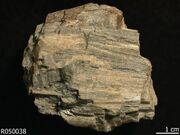Zoisite
Jump to navigation
Jump to search



Description

Tan color fragment of zoisite from RRUFF
An epidote type mineral used as an ornamental stone. Zoisite was named for Baron Zois van Edelstein (1747-1819). It is a lustrous transparent to translucent stone whose color may be grayish-white, peach, pink (Thulite), blue (Tanzanite) or green. Zoisite has been quarried in Tanzania, Austria, Switzerland, Norway (Telemark), Italy (Piedmont), Germany, Scotland, Mexico and the U.S.(Tennessee, Massachusetts, Pennsylvania).
Synonyms and Related Terms
thulite (pink); tanzanite (blue); zoisita (Esp.); zoisyt (Pol.); zoisite (Port.); Zoisit (Deut.); zoisiet (Ned.); saualpite (earlier name)

IR spectrum of zoisite from RRUFF

Raman spectrum of zoisite from RRUFF
Physical and Chemical Properties
- Orthorhombic system with long, striated, prismatic crystals
- Cleavage is very good lengthwise
- Luster = vitreous to pearly
- Streak = white
- Fracture = uneven to conchoidal
- Birefringence = 0.008 - 0.013
- Fluorescent = generally inert, except for thulite
- Pleochroism = strong; usually blue, purplish red and greenish yellow
| Composition | Ca2(AlOH)Al2(SiO4)3 |
|---|---|
| Mohs Hardness | 6.0 - 6.5 |
| Density | 3.25-3.37 g/ml |
| Refractive Index | 1.685 - 1.725 |
| Birefringence | 0.006 - 0.018 |
Resources and Citations
- Gem Identification Lab Manual, Gemological Institute of America, 2016.
- Mineralogy Database: Zoisite
- G.S.Brady, Materials Handbook, McGraw-Hill Book Co., New York, 1971 Comment: p. 435
- Encyclopedia Britannica, http://www.britannica.com Comment: "zoisite" [Accessed December 11, 2001]. (color photo)(tech info)
- C.W.Chesterman, K.E.Lowe, Audubon Society Field Guide to North American Rocks and Minerals, Alfred A. Knopf, New York, 1979
- Wikipedia: Zoisite (Accessed Mar. 1, 2006 and Dec 2022)
